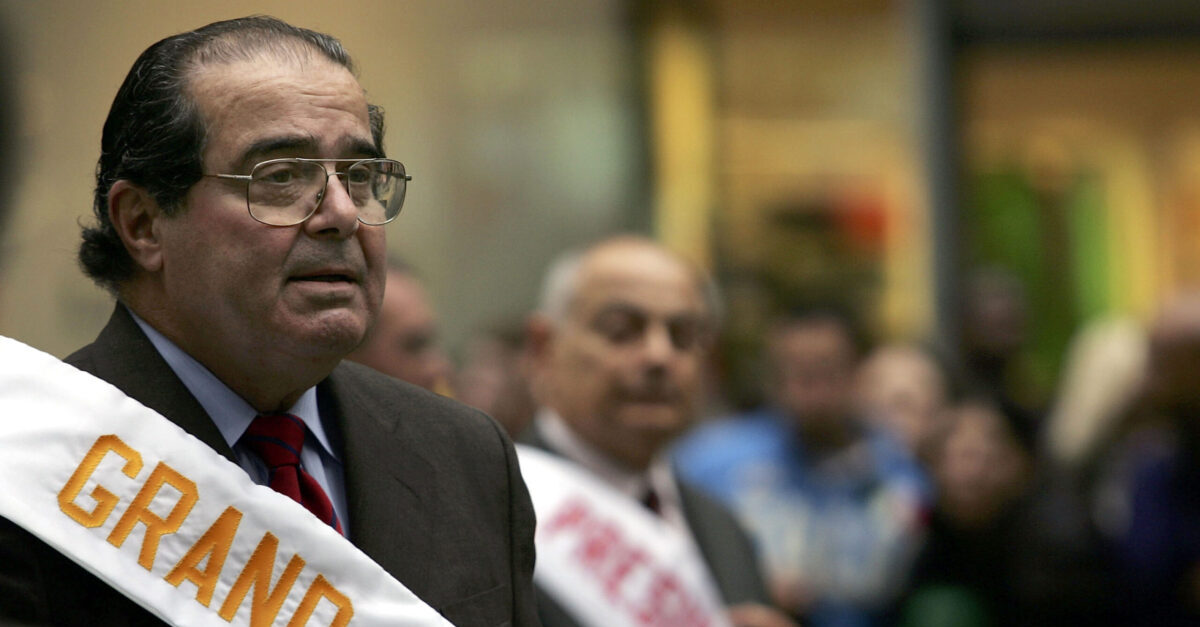
Antonin Scalia, one of Trump’s selections for the since-shuttered National Garden of American heroes, walks Oct. 10, 2005 in the annual Columbus Day Parade in New York City.
President Joe Biden rescinded his predecessor Donald Trump’s order that would have created a National Garden of American Heroes, a proposal panned by at least one historian as a “totalitarian-sounding” idea of the government choosing its cultural luminaries in a manner reminiscent of Stalinist Russia.
Biden jettisoned the idea without fanfare on Friday, in an order revoking roughly half a dozen of Trump’s actions as president from last May through his end of his lame duck session.
Announced last year on the cusp of Independence Day, Trump’s brainchild envisioned a park filled with memorials of U.S. historical, political, and cultural figures his government designated as heroes. Nearly three-quarters of those people were reportedly men, and one was the late Supreme Court Justice Antonin Scalia.
Critics, and a number of professional historians, viewed Trump’s executive order as an effort to gin up a culture war out of then-burgeoning protests against Confederate statues and other monuments activists viewed as oppressive.
Days before issuing his order, Trump ardently defended naming U.S. military bases after the losers of the Civil War, but his executive order focused on the Union side, in order to make his case for the garden.
“To destroy a monument is to desecrate our common inheritance,” Trump’s order read. “In recent weeks, in the midst of protests across America, many monuments have been vandalized or destroyed. Some local governments have responded by taking their monuments down. Among others, monuments to Christopher Columbus, George Washington, Thomas Jefferson, Benjamin Franklin, Francis Scott Key, Ulysses S. Grant, leaders of the abolitionist movement, the first all-volunteer African-American regiment of the Union Army in the Civil War, and American soldiers killed in the First and Second World Wars have been vandalized, destroyed, or removed.”
Some names selected were decidedly non-controversial, including abolitionist Frederick Douglass, Civil Rights leader Martin Luther King, Jr., trailblazing pilot Amelia Earhart, and baseball legend Jackie Robinson, among many others. Others, like Columbus, had been the subject of then-raging debates about memorializing U.S. history.
Beyond the names selected, some historians found the concept of the garden suspect.
“No president of the United States or federal government has any business dictating us citizens who our historical heroes should be,” Michael Beschloss, the scholar and author of Presidents of War, told Axios at the time. “This is not Stalin’s Russia. Any American who loves democracy should make sure there is never some official, totalitarian-sounding ‘National Garden of American Heroes,’ with names forced upon us by the federal government.”
The other Trump-era executive orders that hit the chopping block were issued on May 28, 2020, purporting to “prevent online censorship” in his wrangling with social media companies; on June 26, 2020, threatening tough prosecution for destroying monuments, memorials and statues; on Dec. 10, 2020, to “rebrand” foreign assistance to let recipients know that U.S. taxpayers paid for it; and on Jan. 18 this year, making it harder to prosecute people for violating U.S. government regulations.
(Photo by Spencer Platt/Getty Images)